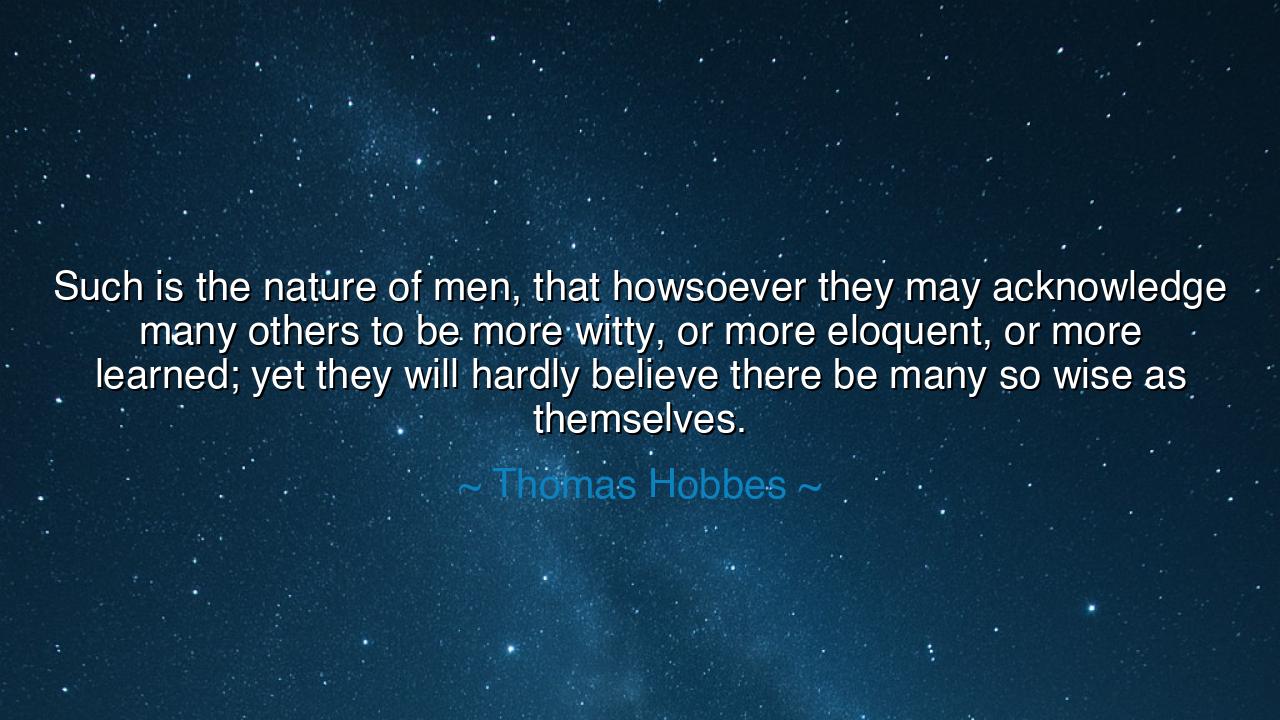
Such is the nature of men, that howsoever they may acknowledge
Such is the nature of men, that howsoever they may acknowledge many others to be more witty, or more eloquent, or more learned; yet they will hardly believe there be many so wise as themselves.






Hear, O children of wisdom, the words of Thomas Hobbes, philosopher of men and their restless desires, who declared: “Such is the nature of men, that howsoever they may acknowledge many others to be more witty, or more eloquent, or more learned; yet they will hardly believe there be many so wise as themselves.” This utterance pierces like a blade into the heart of human pride. For men may bow before the brilliance of others, they may applaud eloquence and marvel at knowledge, yet in the quiet chamber of their souls, each one still clings to the belief that he himself is most wise.
The origin of this teaching lies in Hobbes’s great work Leviathan, where he described the passions, fears, and illusions that govern mankind. He saw that men are not only driven by hunger and power, but also by vanity, that inner fire that convinces each soul of its superior judgment. A man may admit another’s quick wit, or greater learning in books, but to surrender the crown of wisdom—this, Hobbes declared, most men cannot endure. For to admit another wiser is to confess one’s own blindness, and pride resists such humility.
History reveals countless examples of this folly. Consider the tale of Athens, where the oracle at Delphi proclaimed Socrates the wisest of men. Socrates himself denied it, saying he knew nothing; yet when he questioned others, he found that though they claimed knowledge, they were blind to their ignorance. They thought themselves wise, yet were not. Their pride led them to despise him, and in their rage they condemned him to death. Thus, the pride Hobbes names is no idle weakness, but a poison that destroys truth and punishes the truly humble.
So too in the courts of kings. How many rulers, surrounded by counselors and generals, have nodded at their eloquence but secretly thought, “None is wiser than I”? Such arrogance has led empires to ruin. Napoleon, though brilliant in strategy, trusted his own counsel above all, and his pride drove him into the snows of Russia, where his armies perished. He may have acknowledged others as brave or skilled, but he could not admit another wiser than himself. The end of his empire was the price of his vanity.
Yet Hobbes does not speak only of kings and philosophers, but of every man. In each of us lies the same temptation: to believe that our judgment is truer than others’, that our reasoning is sharper, that our perspective is the measure of truth. This pride blinds us to learning, hardens us against counsel, and makes us slow to admit error. The danger, therefore, is not distant, but near, dwelling in every human breast.
But, O listener, the cure lies also within. To recognize this tendency is the first step to overcoming it. True wisdom begins with humility: the admission that one’s knowledge is small, one’s vision limited, one’s judgment fallible. The man who knows his ignorance is greater than the man who boasts of his wisdom. For humility opens the door to learning, while pride bars it shut.
Therefore, the lesson is clear: do not be deceived by your own heart. When you hear another speak, do not dismiss them thinking yourself superior. Seek instead to find the fragment of truth in their words. Be quick to listen, slow to judge, and eager to learn. For the one who shares his wisdom multiplies it, but the one who hoards it in pride diminishes even what he has.
So remember the teaching of Thomas Hobbes: men may grant to others wit, eloquence, and learning, but each clings to his own wisdom as supreme. Resist this nature, cultivate humility, and walk in the path of true understanding. For only when you set aside the crown of pride can you wear the crown of wisdom, and only then can your soul grow into the greatness for which it was made.






AAdministratorAdministrator
Welcome, honored guests. Please leave a comment, we will respond soon